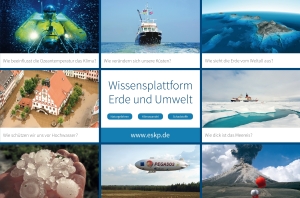The “Erde und Umwelt – Earth System Knowledge Platform” ESKP has been online since Saturday. At http://www.eskp.de, scientists from eight Helmholtz centres present current research results and detailed background knowledge on “impacts of climate change”, “natural hazards”, and “dispersion of pollutants in the environment.”
The impacts of climate change, early recognition and protection against geological natural hazards and weather-related extreme events, and the dispersion of pollutants in the environment are big challenges facing our society. These complex tasks require interdisciplinary cooperation of the Helmholtz centres, as often very different scopes of scientific knowledge have to be pooled to obtain a clear view of the situation. This also holds for slowly progressing processes that might be associated with climate change and lead to various effects, such as a changed risk of storm floods on the North Sea. Relationships and consequences can be explained comprehensively by a holistic assessment and the pooling of expert knowledge only.
ESKP is an information pool and the central contact point for the public. Existing knowledge of the Helmholtz centres involved in ESKP is processed in an understandable manner for various target groups (including authorities, politics, decision-makers, media, population). The information offered consists of texts, interviews, real-time data, graphical representations, images, and films. References to expert publications and generally understandable brochures complete the offer. In case of further questions, the experts of the research centers may be contacted.
The project is coordinated by the German Research Centre for Geo-sciences GFZ and the Helmholtz Zentrum Geesthacht – Centre for Materials and Coastal Research (HZG). In addition, the Alfred Wegener Institute – Helmholtz Centre of Polar and Marine Research (AWI), the German Aerospace Center (DLR), Forschungszentrum Jülich (FZJ), GEOMAR Helmholtz Centre for Ocean Research Kiel, Karlsruhe Institute of Technology (KIT), and the Helmholtz Centre for Environmental Research (UFZ) participate in the Helmholtz Earth System Knowledge Platform.

